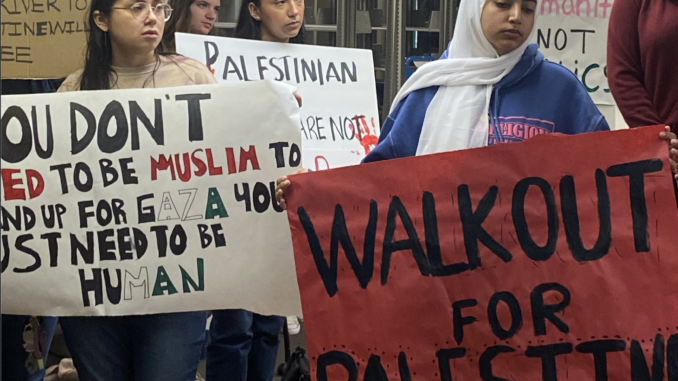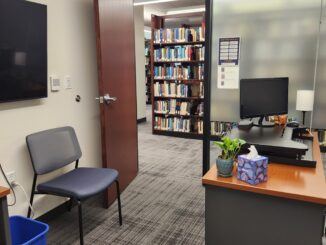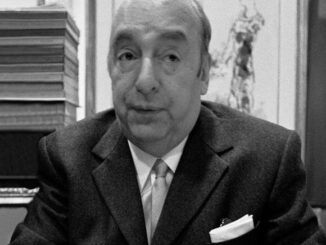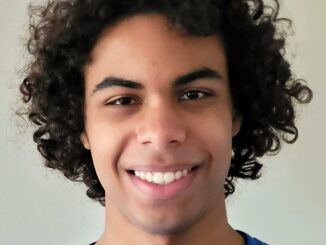
By: Betsy Carreño & Gillian Adkins
Dominican students outraged by the humanitarian crisis in Gaza organized a walkout for Palestine on Nov. 6.
Approximately 200 faculty and students gathered around the Cyber Café on Monday to stand in solidarity with the victims of the humanitarian crisis in Gaza. There were students with around 10 signs with phrases such as, “Bombing kids is not self-defense.”
At 12:07 p.m., sophomore Grettel Gomez Reyes spoke at the event stating: “We are here to support the humanitarian issues that are being faced right now. This is not about politics; we are not here to pick sides or decide who’s wrong or who’s right.”
Junior Marwa Abdullah also talked about the history of the conflict in Gaza.
“We are not looking at it in a vacuum,” Abdullah said. “We are looking at the past 75 years of oppression that have been happening in Palestine.”
In Al Jazeera’s “Al Nakba: the history of Palestine since 1799”, a detailed timeline of Palestine’s history is given. After World War I, British armies began to defeat Ottoman forces and conquer Palestine thus it was placed under UK administration.
The Sykes-Picot Agreement was a secret wartime treaty between France and Britain that sought to divide up the Arab Middle East lands post-WWI.
Britain then abandoned the agreement with France. In 1917, the Balfour Declaration promised a “Jewish National Home” in Palestine.
Following the Balfour Declaration, there was an influx of Zionists moving to Palestine backed by Britain, but Palestinians resisted. Land was then purchased by Israeli settlers, which displaced many Palestinians from their homes.
In 1947, the United Nations (UN) proposed a plan to partition Palestine into an Arab and Jewish state. Under this plan, Jews would be given 55% of the land. They only made up one-third of the population.
The plan was rejected by Palestinian and Arab allies, but by 1948, Zionists had captured many Palestinian cities and displaced its residents. During this time, the Arab-Israeli War broke out between Israel and neighboring countries: Egypt, Syria, Jordan, Iraq, and Lebanon.
This time is referred to as the Nakba or “the catastrophe”, which has resulted in many Palestinians being displaced or killed.
Abdullah explained how the tragedies of Nakba has continued.
“When we use the term Nakba we do not refer to [it] as a time period that ended, we refer that it started after [1948] and this catastrophe has kept going and led to the denial of Palestinian rights,” said Abdullah. “Many were pushed to the Gaza Strip and West Bank; many were killed by Israeli forces while trying to return to their homes. Palestinians are still being pushed from their homes in the West Bank because of illegal settlements and are being tortured and harassed by Israeli soldiers.”
On Oct. 7, armed conflict broke out between Israel and Hamas, an Islamist-Militant Group, after Hamas launched a series of attacks on southern Israel. According to Al Jazeera, 1,200 people were killed and another 240 were taken hostage.
The Israel Defense Forces (IDF) launched counterattacks, a series of retaliatory airstrikes across Gaza and the West Bank. Israel cut off access to food, electricity, and fuel for the 2.3 million residents of the Gaza Strip. Over 70% of people living in Gaza have been displaced by the IDF’s continuous bombings.
Reuters stated that “three Palestinian human rights groups said they have asked the International Criminal Court to investigate Israel, accusing it of committing war crimes including genocide by bombing and besieging the Gaza Strip.”
As of Nov. 6, the Palestinian Health Ministry has reported 10,022 Palestinians killed by Israeli strikes, 4,104 of those being children and 622 being the elderly, according to CNN.
Abdullah stated that these statistics shocked and angered Dominican students.
Audience members were very engaged throughout the event. They silently nodded along with the speakers as they explained it is not about who is right or wrong. They wanted to understand that children are dying. At the end, members lined up to talk to the speakers and shared their thoughts.
Sophomore Jupiter Jones said she thinks it is important for students to understand their privileges when looking at the situation.
“We are not worried about going to sleep and not waking up in the morning,” said Jones. “We are also not worried about losing our parents in the middle of the night due to a bomb. I think it is important that we look at our privilege, turn it around and use it for something that is good.”
Abdullah also stated that the intent of the walkout was to take an institutional stance.
“I found that Dominican’s response to this has been inadequate to a vast degree, especially when we compare it to other global crises that have happened,” said Abdullah. To me this is not a situation where someone can remain neutral on what is happening. People are dying at [an] astronomical rate.”
bcarreno@my.dom.edu
gadkins@my.dom.edu



